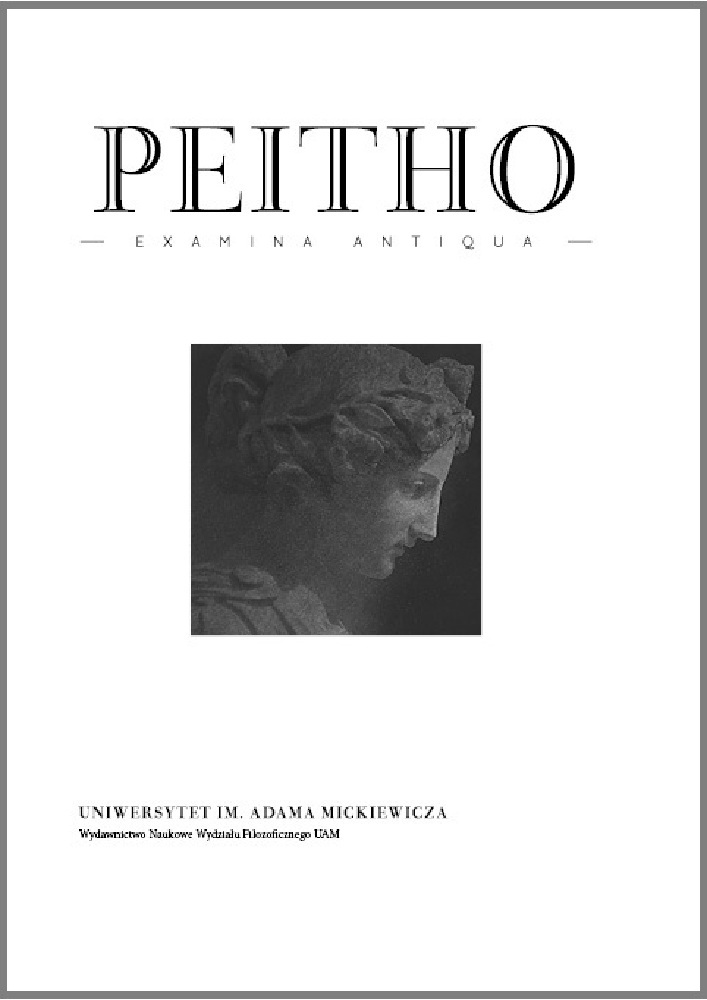Abstract
The article examines the state of research on Michael of Ephesus as a probable author of the Commentaries on Metaphysics E–N, mainly the works of Leonardo Tarán and Concetta Luna. In spite of their opposed views (Tarán rejects Michael’s authorship of the commentaries, while Luna supports it), they both agree on the mediocrity of the Byzantine author. The article questions the criteria for this negative appraisal and offers some material for reconsidering Michael of Ephesus’ idea of philosophical culture.
References
Alexander, P., 1957, The Patriarch Nicephorus of Constantinople : Ecclesiastical and Image Worship in the Byzantine Empire, Oxford.
Arabatzis, G., 2004, “Michel d’Ephèse et le cercle philosophique d’Anne Comnène. Introduction à la question du timioteron”, Parnassos 46, pp. 105–112.
Arabatzis, G., (2012), “Michael of Ephesus and the philosophy of living things (In De partibus animalium, 22.25–23.9)”, The Many Faces of Byzantine Philosophy, K. Ierodiakonou, B. Bydén (eds.) (Athens, pp. 51-78).
Arabatzis, G., 2006, Παιδεία και Επιστήμη στον Μιχαήλ Εφέσιο. Εις περί ζώων μορίων Α 1,3–2,10 [= Paideia et épistème chez Michel d’Ephèse, in de Part. Anim., I, 1,3–2,10], Athènes.
Arabatzis, G., 2009, “Michael of Ephesus on the empirical man, the scientist and the educated man (in EN X and in PA I)”, in: C. Barber, D. Jenkins (eds.), pp. 163–84.
Arabatzis, G., 2010, “Le «montage» par Michel Psellos du commentaire d’Hermias sur le Phèdre de Platon”, Peitho 1, pp. 111–120.
Arabatzis, G., 2012, “Animal Rights in Byzantine Thought”, in: E. D. Protopapadakis (ed.), Animal Ethics. Past and Present Perspectives, Berlin, pp. 103–111.
Aubenque, P., 1960, “Science, culture et dialectique chez Aristote”, Congrès de Lyon : Actes du Congrès de l’Association Guillaume Budé, Paris, pp. 144–149.
Balme, D. M., 1987, “Aristotle’s Biology was not Essentialist”, in: A. Gotthlef, J. Lennox (eds.), Philosophical Issues in Aristotle’s Biology, Cambridge, pp. 291–312.
Barber, C., Jenkins, D. (eds.), 2009, Medieval Greek Commentaries on the Nicomachean Ethics, Leiden–Boston.
Browning, R., 1962, “An Unpublished Funeral Oration on Anna Comnena”, PCPhS 188, pp. 1–12; Repris in Idem, 1977, Studies on Byzantine History, Literature and Education, chapitre VII, London; Repris in: Sorabji, R. (ed.), 1990, pp. 393–406.
Darrouzès, J. (ed.), 1970, Georges et Démétrios Tornikès, Lettres et Discours, Paris.
Donini, P.-L., 1968, “Il De Anima di Alessandro di Afrodisia e Michele Efesio”, RFIC 96, pp. 316–323.
Ebbesen, S., 1990, “Philoponus, ‘Alexander’, and the Origins of medieval Logic”, in: Sorabji, R. (ed.), pp. 445–461.
Frankopan, P., 2009, “The literary, cultural and political context for the twelfth-century commentary on the Nicomachean Ethics”, in: C. Barber, D. Jenkins (eds.), pp. 45–62.
Frede, M., Patzig, G., 1988, Aristoteles “Metaphysik Z”: Text, Übersetzung und Kommentar, München.
Freudenthal, J., 1987, Die durch Averroes erhaltenen Fragmente Alexanders zur Metaphysik des Aristoteles untersucht und übersetzt, New York–London (Berlin 1884).
Krumbacher, K., 1897, Geschichte der byzantinischen Literatur, vol. II, München.
Lloyd, G. E. R., 1987, “Aristotle’s Zoology and his Metaphysics”, in: D. Devereux, P. Pellegrin (eds.), Biologie, Logique, et Metaphysique chez Aristote, Paris, pp. 7–35.
Luna, C., 2001, Trois études sur la tradition des commentaires anciens à la Métaphysique d’Aristote, Leiden–Boston.
Moraux, P., 1942, Alexandre d’Aphrodise. Exégète de la noétique d’Aristote, Liège–Paris.
Moraux, P., 2001, Der Aristotelismus bei den Griechen von Andronikos bis Alexander von Aphrodisias, III. Alexander von Aphrodisias, oeuvre posthume, J. Wiesner (ed.), Berlin.
Movia, G. (ed.), 2007, Alessandro di Afrodisia e Pseudo-Alessandro, Commentario alla Metafisica di Aristotele, Milan.
Oehler, K., 1969, Antike Philosophie und byzantinisches Mittelalter, München.
Praechter, K., 1906, “Compte rendu de M. Hayduck (éd.), Michaelis Ephesii in Libros De partibus animalium, De animalium motione, De animalium incessu. Commentaria in Aristotelem Graeca XXII 2”, GGA 168, pp. 861–907.
Praechter, K., 1990, “Review of the Commentaria in Aristotelem Graeca”, V. Caston (trad.), in: Sorabji, R. (ed.), pp. 31–54.
Sharples, R. W., 1987, “Alexander of Aphrodisias : Scholasticism and Innovation”, ANRW II, 36.2, Berlin–New–York, pp. 1176–1243.
Sharples, R. W., 2003, “Compte rendu de Luna, 2001”, CR 53, pp. 306–308.
Sorabji, R. (ed.), 1990, Aristotle Transformed: The Ancient Commentators and Their Influence, London.
Sorabji, R., 1990, “The Ancient Commentators on Aristotle”, in: Idem (ed.), pp. 1–30.
Tarán, L., 1981, “Compte rendu du livre de Paul Moraux, Der aristotelismus, I”, Gnomon 46, pp. 721–750.
Tarán, L., 1987, “Syrianos and Pseudo-Alexander’s Commentary on Metaphysics E–N”, J. Wiesener (ed.), Aristoteles Werk und Wirkung: Paul Moraux gewidmet, Bd. II, Berlin, pp. 215–232.
Tarán, L., 2005, “Compte rendu du livre de Luna, 2001”, Gnomon 77, pp. 196–209.
Wedin, M. V., 1991, “PARTisanship in Metaphysics Z”, AncPhil 11, pp. 361–385.
Zahlfleisch, J., 1900, “Einige Gesichtspunkte für die Auffassung und Beurtheilung der Aristotelischen Metaphysik”, AGPh 13, pp. 85–89.
License
Peitho provides immediate open access to its content on the principle that making research freely available to the public supports a greater global exchange of knowledge.
